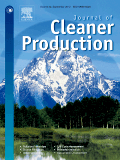
Journal of Cleaner Production
Scope & Guideline
Pioneering Research in Environmental Sustainability
Introduction
Aims and Scopes
- Sustainable Production and Consumption:
The journal emphasizes research on sustainable production methods and consumption patterns, advocating for practices that minimize waste and resource use while maximizing efficiency. - Environmental Management and Policy:
It explores the intersection of environmental management practices and policy frameworks, addressing how regulations and incentives can drive cleaner production and sustainability. - Innovative Technologies for Environmental Impact Reduction:
Research on innovative technologies that enhance sustainability and reduce environmental footprints, such as renewable energy technologies, waste-to-energy processes, and advanced recycling methods. - Life Cycle Assessment (LCA) and Sustainability Metrics:
The journal publishes studies that utilize LCA and other sustainability assessment tools to evaluate the environmental impacts of products, processes, and systems. - Circular Economy and Resource Recovery:
A significant focus on circular economy practices, including resource recovery, waste minimization, and the development of sustainable materials and products. - Interdisciplinary Approaches to Environmental Challenges:
Encourages interdisciplinary research that integrates social, economic, and environmental dimensions to address complex sustainability challenges.
Trending and Emerging
- Digital Technologies and Sustainability:
The integration of digital technologies, such as AI and data analytics, into sustainability practices is gaining momentum, highlighting the role of technology in enhancing efficiency and reducing environmental impacts. - Climate Change Mitigation Strategies:
A significant increase in research addressing specific strategies for climate change mitigation, including carbon accounting, renewable energy transitions, and adaptation measures. - Circular Economy Innovations:
Innovations in circular economy practices are on the rise, focusing on resource recovery, waste minimization, and sustainable product design. - Sustainable Agriculture and Food Systems:
Emerging research areas include sustainable agricultural practices, food waste reduction, and the environmental impacts of food production systems. - Stakeholder Engagement in Sustainability:
There is a growing emphasis on stakeholder engagement and social dimensions of sustainability, exploring how public perception and behavior influence environmental practices. - Policy Frameworks for Sustainable Development:
Research is increasingly focusing on the role of policy frameworks and government interventions in promoting sustainable practices across various sectors.
Declining or Waning
- Traditional Waste Management Practices:
Research focused solely on traditional waste management practices is declining as the journal shifts towards circular economy frameworks and innovative resource recovery methods. - Single-Use Technologies:
There is a noticeable decrease in publications centered on single-use technologies, as the emphasis on sustainability pushes for more reusable and recyclable solutions. - Conventional Energy Systems:
Research on conventional energy systems, particularly fossil fuels, is waning as the journal emphasizes renewable energy and sustainable alternatives. - Non-Integrated Approaches to Sustainability:
Studies that do not consider integrated approaches to sustainability, such as the water-energy-food nexus, are becoming less frequent, reflecting a shift towards more holistic frameworks. - Sector-Specific Studies without Broader Context:
Research that focuses narrowly on specific sectors without considering broader environmental or social implications is declining, as interdisciplinary studies gain traction.
Similar Journals
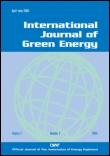
International Journal of Green Energy
Advancing sustainable solutions for a greener future.The International Journal of Green Energy is a premier publication that plays a pivotal role in the field of renewable energy and sustainability. Published by Taylor & Francis Inc, this journal, with ISSN 1543-5075 and E-ISSN 1543-5083, has established itself as a crucial platform for sharing innovative research and developments from 2005 to 2024. With a commendable Q2 ranking in the category of Renewable Energy, Sustainability and the Environment, it ranks 100 out of 270 in Scopus, positioning itself in the 63rd percentile of its field. The journal is dedicated to advancing knowledge and fostering dialogue around green technologies and sustainable practices, providing invaluable insights for researchers, industry professionals, and students alike. Although it does not offer open access options, the journal's commitment to rigorous peer review ensures that only high-quality research is published, making it an essential resource for those seeking to explore and understand the complexities of green energy solutions.

MRS Energy & Sustainability
Advancing Energy Solutions for a Sustainable FutureMRS Energy & Sustainability is a premier interdisciplinary journal published by SpringerNature, focusing on advancing the understanding of energy systems and sustainability within the context of materials science and engineering. Since its inception in 2014, this journal has rapidly gained recognition in the academic landscape, achieving impressive rankings including Q1 in Electronic, Optical and Magnetic Materials and Mechanics of Materials, and Q2 in Energy Engineering and Power Technology as well as Renewable Energy, Sustainability and the Environment, as of 2023. The journal's ISSN is 2329-2229 and E-ISSN is 2329-2237. With a commitment to open access, it provides researchers and professionals with the latest findings and insights essential for guiding innovations in energy solutions and sustainable practices. The journal's global reach and high-impact reputation make it an invaluable resource for scientists, engineers, and policymakers dedicated to addressing the contemporary challenges of energy and sustainability. With a diverse scope and high Scopus rankings, MRS Energy & Sustainability continues to be at the forefront of research that shapes our energy future.
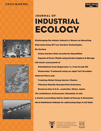
JOURNAL OF INDUSTRIAL ECOLOGY
Transforming Industrial Systems for a Greener TomorrowJOURNAL OF INDUSTRIAL ECOLOGY, published by Wiley, is a leading academic journal that focuses on the intersection of industrial practices and ecological sustainability. With an ISSN of 1088-1980 and an E-ISSN of 1530-9290, this journal has established itself as a premier outlet for research in economic, environmental, and social sciences, evidenced by its Q1 rankings in key categories such as Economics and Econometrics, Environmental Science, and General Social Sciences as of 2023. Spanning over two decades from 1997 to 2024, it offers invaluable insights into innovative approaches for designing sustainable industrial systems, informing policy decisions, and advancing interdisciplinary collaborations. While the journal does not currently offer open access options, its high impact in the field—illustrated by its impressive Scopus rankings, where it ranks 5th among 275 in General Social Sciences and 23rd among 233 in General Environmental Science—reinforces its importance to researchers, professionals, and students dedicated to the principles of sustainable development and industrial ecology.
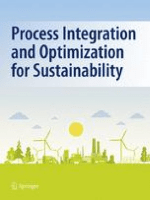
Process Integration and Optimization for Sustainability
Integrating Knowledge for Environmental ProgressProcess Integration and Optimization for Sustainability is an esteemed journal, published by SPRINGERNATURE, dedicated to advancing knowledge in the realms of chemical engineering, environmental science, and sustainable development. Established in 2017, this journal provides a platform for rigorous research that addresses the critical challenges of integrating and optimizing processes to achieve sustainability goals. With a commendable Q2 category ranking across various disciplines such as Chemical Engineering, Control and Systems Engineering, and Geography, along with impressive Scopus rankings, it has quickly established itself as a vital resource for researchers, professionals, and students. The journal's focus on innovative solutions for pollution control, renewable energy, and effective waste management aligns with global sustainability objectives. For academics seeking to publish their findings or stay abreast of the latest advances in these areas, Process Integration and Optimization for Sustainability is an indispensable resource that promises to foster impactful discussions and disseminate vital knowledge within the academic community.
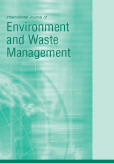
International Journal of Environment and Waste Management
Fostering Dialogue on Waste Minimization StrategiesThe International Journal of Environment and Waste Management, published by InderScience Enterprises Ltd, serves as a vital platform for researchers and professionals in the fields of Environmental Engineering and Waste Management. With an ISSN of 1478-9876 and an E-ISSN of 1478-9868, this journal encompasses a wide range of topics from innovative technologies in waste processing to sustainable environmental practices. Ranked in the Q3 category for Environmental Engineering and Q4 for Waste Management and Disposal in 2023, it holds significance in advancing knowledge and impacting practices in these essential domains. The journal accepts articles that contribute to the understanding and development of effective waste management strategies, ensuring alignment with contemporary environmental challenges. As it converges years from 2006 to 2024, it continues to attract contributions that reflect the latest research and methodologies. For scholars, students, and practitioners alike, this journal is an invaluable resource, enriching the dialogue around environmental sustainability and waste minimization.
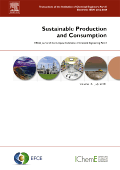
Sustainable Production and Consumption
Pioneering Research for a Resilient PlanetWelcome to Sustainable Production and Consumption, a premier journal published by Elsevier in the vibrant field of sustainability and environmental science. With an ISSN of 2352-5509, this journal has established itself as a leading platform for innovative research and discourse on sustainable manufacturing, consumption practices, and environmental technologies. As evidenced by its impressive 2023 rankings—Q1 in Environmental Chemistry, Environmental Engineering, Industrial and Manufacturing Engineering, and Renewable Energy, Sustainability and the Environment—the journal ranks among the top tier of its field. Researchers and professionals alike are invited to explore the journal’s rigorous peer-reviewed articles, which aim to advance the understanding and implementation of sustainable practices across various industries. With a strong commitment to disseminating impactful research, Sustainable Production and Consumption serves as an essential resource for academics, policy makers, and industry leaders seeking to address the challenges of modern environmental sustainability.

Biofuels Bioproducts & Biorefining-Biofpr
Exploring the Frontiers of Renewable Energy and BioproductsBiofuels Bioproducts & Biorefining (Biofpr), published by WILEY, stands at the forefront of research dedicated to the sustainable production and utilization of biofuels and bioproducts. With its robust impact, as evidenced by its placement in the Q2 quartile across both Bioengineering and Renewable Energy, Sustainability and the Environment categories, this journal provides a vital platform for disseminating high-quality research aimed at advancing bio-refining technologies and bio-product innovations. Covering a wide range of topics from production methodologies to environmental impacts, Biofpr serves as an essential resource for researchers, professionals, and students eager to contribute to the evolving领域 of renewable energy solutions. Its consistent performance in the Scopus rankings further underscores its importance, ranking #78 in Renewable Energy and #51 in Chemical Engineering, making it an indispensable read for those committed to sustainability and scientific advancement in the biofuels sector.
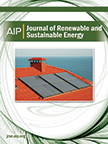
Journal of Renewable and Sustainable Energy
Empowering Tomorrow's Energy InnovationsThe Journal of Renewable and Sustainable Energy, published by AIP Publishing, stands at the forefront of research in the fields of renewable energy and sustainable practices. With an ISSN of 1941-7012, this journal aims to foster innovative research and exchange of knowledge on sustainable technologies and methodologies that contribute to environmental conservation and energy efficiency. Achieving a prestigious Q2 ranking in the category of Renewable Energy, Sustainability, and the Environment, it ranks 135 out of 270 journals in Scopus, signifying its impactful contributions to the field. The journal, active from 2010 to 2024, provides a platform for authors, analysts, and practitioners to disseminate significant findings that can shape future environmental policies and energy frameworks. Although not currently an Open Access publication, it remains an essential resource for researchers dedicated to advancing sustainable development and energy solutions.
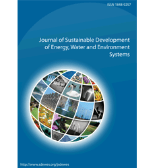
Journal of Sustainable Development of Energy Water and Environment Systems-JSDEWES
Uniting Science and Sustainability for Global ImpactJournal of Sustainable Development of Energy Water and Environment Systems (JSDEWES), published by the International Centre for Sustainable Development of Energy, Water, and Environment Systems, is a premier Open Access journal that has been shaping the discourse surrounding sustainable energy, water management, and environmental systems since its inception in 2013. Based in Croatia, this esteemed journal, bearing the ISSN 1848-9257, emphasizes an interdisciplinary approach, making significant strides within its converged years from 2013 to 2024. With impressive rankings in 2023—Q3 in Energy Engineering and Power Technology, Q2 in Environmental Science (miscellaneous), and noteworthy positions in Renewable Energy, Sustainability and the Environment, and Water Science and Technology—JSDEWES showcases its commitment to advancing knowledge and innovation in crucial areas affecting our planet's sustainability. Designed for an audience of researchers, professionals, and students alike, this journal is pivotal in fostering research that enhances our understanding and implementation of sustainable practices, while its esteemed Scopus rankings further underline its impact and contribution to the field.

Recycling
Innovating recycling practices for a circular economy.Recycling is a renowned international open access journal published by MDPI that has been dedicated to advancing the field of recycling and waste management since its inception in 2015. With a focus on innovative technologies, management practices, and policy frameworks, this journal serves as a platform for researchers, professionals, and students who are eager to explore sustainable solutions in resource recovery and material efficiency. Based in beautiful Basel, Switzerland, Recycling boasts an impressive impact with a 2023 ranking of Q2 in Management, Monitoring, Policy and Law and Q1 in Materials Science (Miscellaneous), signifying its pivotal role in driving forward-thinking research in these critical areas. The journal is indexed in Scopus, with strong performance metrics highlighting its relevance and quality, such as a rank of #42 in Waste Management and Disposal. As an open access publication, Recycling promotes the dissemination of knowledge, ensuring that groundbreaking research is freely available to a global audience. Whether you are a seasoned researcher or a student eager to contribute to the discourse surrounding sustainable practices, Recycling provides a vital resource for those committed to the future of waste management and environmental sustainability.